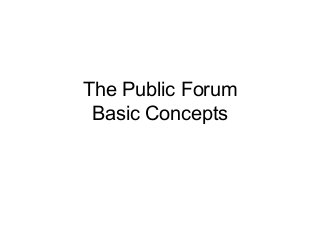
The public forum -basic concepts
- 1. The Public Forum Basic Concepts
- 2. Defining the Public Forum • Generically: A public forum is a venue that the government must make available for free- speech activity • Three ways of identifying them – Historical: “time out of mind” • Problem: federalism and local experimentation – Functional-historical: venues that today serve the same functions as streets and parks – “Reverse functional”: venues where expressive activity won’t interfere with the primary function of the venue • An abortive doctrinal effort in the 1960s
- 3. Justifications for expressive activity in public forums • Access to a wide array of people • Listeners being exposed to material they might not seek out • Targeting particular audiences – Good policy reasons for using forums for speech, but why are they constitutionally required?
- 4. Public Forums as Subsidies • Compare public forum to how wealthy people (Meg Whitman, George Soros) get their views disseminated – They purchase the means of dissemination • Less wealthy people can’t do that – They use the public forum • So the public forum serves as a subsidy to speech – An example of Madisonian or New Deal ideas in existing doctrine?
- 5. Thinking About Subsidies • Examples – Schneider: the public must forgo some environmental protection to subsidize speech – Street and parks: disruption of traffic, loss of business • When the Court rejects a public forum claim, maybe it’s because it thinks that the size of the subsidy is too large – Frisby: The subsidy comes in the form of the disruption of an individual person’s privacy (and that of his/her neighbors) • Recall the discussion of the subsidy issue in libel law – But CCNV is hard to explain on this ground • Subsidy: cost of cleaning up?
- 6. Fees and Subsidies • Cities can charge fees measured by the estimated size of the demonstration and the costs of policing it (Cox) • More generally, cities can charge (some) cost-justified fees – Clean-up costs in excess of what the city would incur without the demonstration – It’s worth noting that cities have gotten pretty good at coming up with reasonably good methods of determining the excess costs (overtime pay for police officers, and the like) • Two problems – The impecunious group that can’t afford the cost-justified fee • The best analysis of the problem is an Israeli case, Majority Camp v. Israel Police • The cases, though few, tend to suggest that a cost-justified fee can be required of such a group (Long Beach case, 574 F.3d 1011) • Other cases suggest a distinction between large groups, which can be required to pay, and small ones, which cannot (Boardley, 515 F.3d 508 – a permit case, not a fee case) – Excess policing costs (beyond those measured by the size of the group) caused by a hostile audience • Forsyth County says that the fee there wasn’t cost-justified • There’s a tendency to think that the solution to the hostile audience problem (arrest the threateners, not the speaker) implies that cost-justified fees aren’t permissible here – Not necessarily true – Why shouldn’t a group that can afford to do so (Jon Stewart) pay the costs?
- 7. Fees and Subsidies • Cities can charge fees measured by the estimated size of the demonstration and the costs of policing it (Cox) • More generally, cities can charge (some) cost-justified fees – Clean-up costs in excess of what the city would incur without the demonstration – It’s worth noting that cities have gotten pretty good at coming up with reasonably good methods of determining the excess costs (overtime pay for police officers, and the like) • Two problems – The impecunious group that can’t afford the cost-justified fee • The best analysis of the problem is an Israeli case, Majority Camp v. Israel Police • The cases, though few, tend to suggest that a cost-justified fee can be required of such a group (Long Beach case, 574 F.3d 1011) • Other cases suggest a distinction between large groups, which can be required to pay, and small ones, which cannot (Boardley, 515 F.3d 508 – a permit case, not a fee case) – Excess policing costs (beyond those measured by the size of the group) caused by a hostile audience • Forsyth County says that the fee there wasn’t cost-justified • There’s a tendency to think that the solution to the hostile audience problem (arrest the threateners, not the speaker) implies that cost-justified fees aren’t permissible here – Not necessarily true – Why shouldn’t a group that can afford to do so (Jon Stewart) pay the costs?